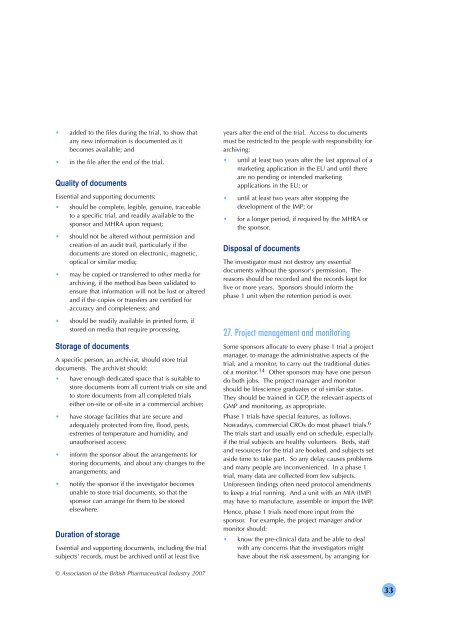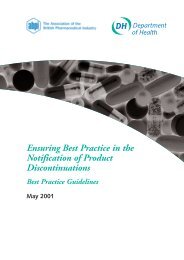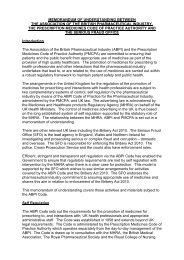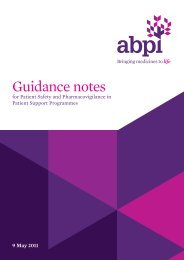ABPI Guidelines for Phase 1 Clinical Trials (PDF
ABPI Guidelines for Phase 1 Clinical Trials (PDF
ABPI Guidelines for Phase 1 Clinical Trials (PDF
You also want an ePaper? Increase the reach of your titles
YUMPU automatically turns print PDFs into web optimized ePapers that Google loves.
• added to the files during the trial, to show that<br />
any new in<strong>for</strong>mation is documented as it<br />
becomes available; and<br />
• in the file after the end of the trial.<br />
Quality of documents<br />
Essential and supporting documents:<br />
• should be complete, legible, genuine, traceable<br />
to a specific trial, and readily available to the<br />
sponsor and MHRA upon request;<br />
• should not be altered without permission and<br />
creation of an audit trail, particularly if the<br />
documents are stored on electronic, magnetic,<br />
optical or similar media;<br />
• may be copied or transferred to other media <strong>for</strong><br />
archiving, if the method has been validated to<br />
ensure that in<strong>for</strong>mation will not be lost or altered<br />
and if the copies or transfers are certified <strong>for</strong><br />
accuracy and completeness; and<br />
• should be readily available in printed <strong>for</strong>m, if<br />
stored on media that require processing.<br />
Storage of documents<br />
A specific person, an archivist, should store trial<br />
documents. The archivist should:<br />
• have enough dedicated space that is suitable to<br />
store documents from all current trials on site and<br />
to store documents from all completed trials<br />
either on-site or off-site in a commercial archive;<br />
• have storage facilities that are secure and<br />
adequately protected from fire, flood, pests,<br />
extremes of temperature and humidity, and<br />
unauthorised access;<br />
• in<strong>for</strong>m the sponsor about the arrangements <strong>for</strong><br />
storing documents, and about any changes to the<br />
arrangements; and<br />
• notify the sponsor if the investigator becomes<br />
unable to store trial documents, so that the<br />
sponsor can arrange <strong>for</strong> them to be stored<br />
elsewhere.<br />
Duration of storage<br />
Essential and supporting documents, including the trial<br />
subjects' records, must be archived until at least five<br />
© Association of the British Pharmaceutical Industry 2007<br />
years after the end of the trial. Access to documents<br />
must be restricted to the people with responsibility <strong>for</strong><br />
archiving:<br />
• until at least two years after the last approval of a<br />
marketing application in the EU and until there<br />
are no pending or intended marketing<br />
applications in the EU; or<br />
• until at least two years after stopping the<br />
development of the IMP; or<br />
• <strong>for</strong> a longer period, if required by the MHRA or<br />
the sponsor.<br />
Disposal of documents<br />
The investigator must not destroy any essential<br />
documents without the sponsor's permission. The<br />
reasons should be recorded and the records kept <strong>for</strong><br />
five or more years. Sponsors should in<strong>for</strong>m the<br />
phase 1 unit when the retention period is over.<br />
27. Project management and monitoring<br />
Some sponsors allocate to every phase 1 trial a project<br />
manager, to manage the administrative aspects of the<br />
trial, and a monitor, to carry out the traditional duties<br />
of a monitor. 14 Other sponsors may have one person<br />
do both jobs. The project manager and monitor<br />
should be lifescience graduates or of similar status.<br />
They should be trained in GCP, the relevant aspects of<br />
GMP and monitoring, as appropriate.<br />
<strong>Phase</strong> 1 trials have special features, as follows.<br />
Nowadays, commercial CROs do most phase1 trials. 6<br />
The trials start and usually end on schedule, especially<br />
if the trial subjects are healthy volunteers. Beds, staff<br />
and resources <strong>for</strong> the trial are booked, and subjects set<br />
aside time to take part. So any delay causes problems<br />
and many people are inconvenienced. In a phase 1<br />
trial, many data are collected from few subjects.<br />
Un<strong>for</strong>eseen findings often need protocol amendments<br />
to keep a trial running. And a unit with an MIA (IMP)<br />
may have to manufacture, assemble or import the IMP.<br />
Hence, phase 1 trials need more input from the<br />
sponsor. For example, the project manager and/or<br />
monitor should:<br />
• know the pre-clinical data and be able to deal<br />
with any concerns that the investigators might<br />
have about the risk assessment, by arranging <strong>for</strong><br />
33









